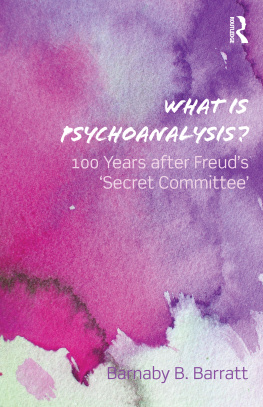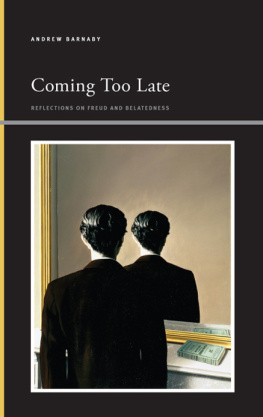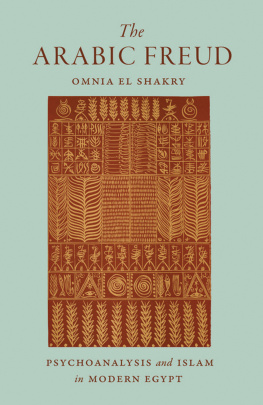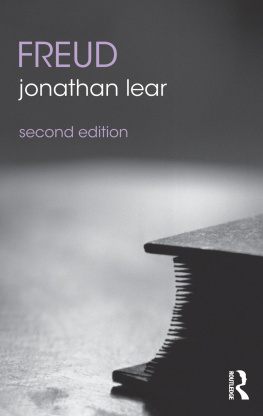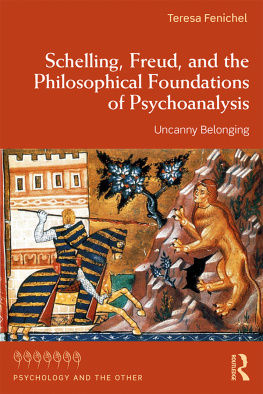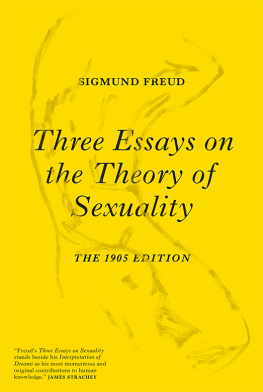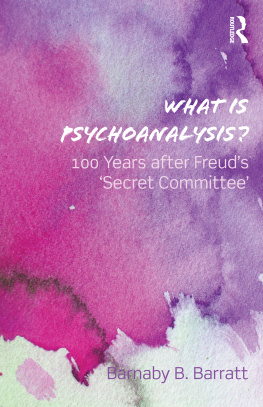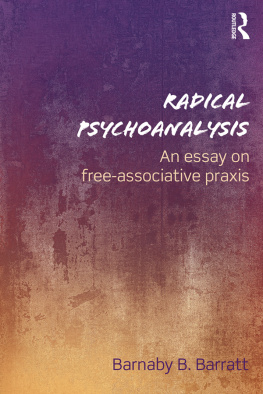What is Psychoanalysis?
In a radically powerful interpretation of the human condition, this book redefines the discipline of psychoanalysis by examining its fundamental assumptions about the unconscious mind, the nature of personal history, our sexualities, and the significance of the Oedipus Complex. With striking originality, Barratt explains the psychoanalytic way of exploring our inner realities, and criticizes many of the schools of psychoanalytic psychotherapy that emerged and prospered during the 20th Century.
In 1912, Sigmund Freud formed a Secret Committee, charged with the task of protecting and advancing his discoveries. In this book, Barratt argues both that this was a major mistake, making the discipline more like a religious organization than a science, and that this continues to infuse psychoanalytic institutes today. What is Psychoanalysis? takes each of the four fundamental concepts that Freud himself said were the cornerstones of his science of healing, and offers a fresh and detailed re-examination of their contemporary importance.
Barratts analysis demonstrates how the profound work, as well as the playfulness, of psychoanalysis, provides us with a critique of the ideologies that support oppression and exploitation on the social level. It will be of interest to advanced students of clinical psychology or philosophy, as well as psychoanalysts and psychotherapists.
Barnaby B. Barratt , formerly Professor of Family Medicine, Psychiatry and Behavioral Neurosciences at Wayne State University in Detroit, he now practices psychoanalysis in Johannesburg, South Africa, and holds professorial appointments at the University of Witwatersrand and at the University of Cape Town.
What is Psychoanalysis?
100 Years after Freud's 'Secret Committee'
Barnaby B. Barratt
First published 2013
by Routledge
27 Church Road, Hove, East Sussex BN3 2FA
Simultaneously published in the USA and Canada
by Routledge
711 Third Avenue, New York, NY 10017
Routledge is an imprint of the Taylor & Francis Group, an informa business
2013 Barnaby B. Barratt
The right of Barnaby B. Barratt to be identified as authors of this work has been asserted by them in accordance with sections 77 and 78 of the Copyright, Designs and Patents Act 1988.
All rights reserved. No part of this book may be reprinted or reproduced or utilized in any form or by any electronic, mechanical, or other means, now known or hereafter invented, including photocopying and recording, or in any information storage or retrieval system, without permission in writing from the publishers.
Trademark notice: Product or corporate names may be trademarks or registered trademarks, and are used only for identification and explanation without intent to infringe.
British Library Cataloguing in Publication Data
A catalogue record for this book is available from the British Library
Library of Congress Cataloging in Publication Data
Barratt, Barnaby B., 1950
What is psychoanalysis?: 100 years after Freud's 'secret committee' /
Barnaby B. Barratt.
p. cm.
Includes bibliographical references.
1. Psychoanalysis. 2. Freud, Sigmund, 18561939. 1. Title.
BF173.B206 2012
150.19'5dc23
2012011078
ISBN: 978-0-415-69273-1 (hbk)
ISBN: 978-0-415-69274-8 (pbk)
ISBN: 978-0-203-09505-8 (ebk)
Typeset in Garamond
by Book Now Ltd, London
May all beings be happy and free; may these writings contribute to the happiness and freedom of all beings.
Contents
Barnaby B. Barratt, PhD, DHS, practices psychoanalysis in Johannesburg, where he is a Training Analyst with the South Africa Psychoanalytic Association, and a member of the International Psychoanalytic Association. He was previously a Training Analyst with the American Psychoanalytic Association and Professor of Family Medicine, Psychiatry, and Behavioral Neurosciences at Wayne State University in Detroit. Currently, he is Senior Research Fellow at the University of Cape Town and Visiting Professor at the University of Witwatersrand. He may be contacted at BBBarratt@Earthlink.net.
Other books by Barnaby B. Barratt
Psychic Reality and Psychoanalytic Knowing
(Analytic Press, 1984)
Psychoanalysis and the Postmodern Impulse: Knowing and Being since Freuds Psychology
(Johns Hopkins University Press, 1993)
The Way of the BodyPrayerPath: Erotic Freedom and Spiritual Enlightenment
(Xlibris/Random House, 2004)
Sexual Health and Erotic Freedom
(Xlibris/Random House, 2005)
Ten Keys to Successful Sexual Partnering
(Xlibris/Random House, 2005)
What is Tantric Practice?
(Xlibris/Random House, 2006)
Liberating Eros
(Xlibris/Random House, 2009)
The Emergence of Somatic Psychology and Bodymind Therapy
(Palgrave Macmillan, 2010)
My purpose in this book is to provoke discussion and genuine dialogue among students, academic colleagues, and practitioners about the authentic conditions of the healing modality known as psychoanalysis. How is this discipline to be defined? What makes psychoanalysis psychoanalytic? And how are we to establish its distinctive features that might empower us to differentiate it from other modes of discourse, and from other modes of dyadic interaction? In my scholarly assessment and in my personal experience, psychoanalysis constitutes one of the great discourses of human liberation. Yet, as a discipline, especially as one that claims not only to heal the psyche but to do so scientifically (which is to say, at the very least, in a methodical and comprehensible manner), it has a peculiar history of recurrent controversies and crises. Even today it is arguably in a disheartening condition of intellectual and experiential disarray; hence, the mandate of renewed examination and debate.
What is psychoanalysis? To anyone unfamiliar with its checkered history, it might seem strange to have to ask this question over 11 decades after Sigmund Freuds proclamation of this new discipline. Surely if it has been around this long, we should know what it is? This may seem stranger still given that, in many parts of the world, the practice of psychoanalysis appears to be thriving. Almost all of the Western European countries have longstanding psychoanalytic organizations and, since the dramatic events of reunification, countries in the former Eastern Bloc are now developing their own institutes. Candidates are being trained, professional papers are being written, conferences are being held, and most importantly patients are being treated. Psychoanalytic organizations all across South and Central America have a vitality that is impressive, and similar organizations are also significantly active in Australasia. In the United States, the American Psychoanalytic Association, as well as other North American institutes affiliated with the International Psychoanalytic Association, remains moderately strong and psychoanalytic therapy, under the auspices of the American Psychological Association, has been an ebullient presence in the past few decades. Moreover, despite cultural differences that are not to be underestimated, the presence of psychoanalytic organizations in other parts of the world South Asia, the Far East, and Africa is gradually being felt. Psychoanalysis may have originated in a Eurocentric manner, and subsequently been dominated by the affluence of its North American adoption, but its universal potential as a healing modality is being explored in ways that are, to say the least, fascinating.

